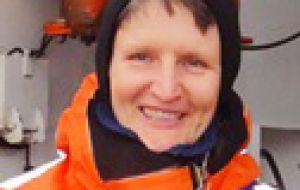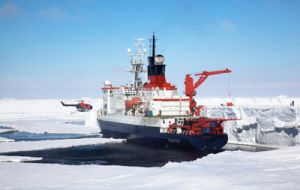MercoPress. South Atlantic News Agency
Research icebreaker Polarstern en route to investigate climate change in Arctic
 “This is an especially exciting cruise this year, since it marks the first time in the past 30 years that the sea-ice has melted so early,” explains biologist Peeken.
“This is an especially exciting cruise this year, since it marks the first time in the past 30 years that the sea-ice has melted so early,” explains biologist Peeken.  The Polarstern expedition, TRANSSIZ, was initiated by the ART (Arctic in Rapid Transition) network and includes 53 researchers from 11 countries
The Polarstern expedition, TRANSSIZ, was initiated by the ART (Arctic in Rapid Transition) network and includes 53 researchers from 11 countries Research icebreaker Polarstern left its home port in Bremerhaven on Tuesday setting a course for the Arctic. Led by Dr Ilka Peeken from the Alfred Wegener Institute, Helmholtz Centre for Polar and Marine Research (AWI) a team of 53 researchers from 11 countries will investigate the effects of climate change in the Arctic, from the surface ice floes down to the seafloor
RV Polarstern will enter the sea-ice zone north of Spitsbergen. Covering two shallow regions on their way to deeper waters, the scientists on board will focus on the processes at work in the ice-covered central Arctic Ocean. Their findings will then be used to supplement the research efforts of late-summer expeditions from the past several years. The researchers will for the first time employ several instruments that constantly measure the seawater’s temperature, salinity, gas composition and algae content.
“We want to determine which animals and plants in the Arctic Ocean are active during the early summer. This is especially exciting this year, since it marks the first time in the past 30 years that the sea ice has begun melting so early,” explains AWI biologist Ilka Peeken.
Over the past few years, the AWI researchers have narrowed their focus on life under the sea ice and at the marginal zone between ice and open water. Global warming is especially making its presence felt in the Arctic, as reflected in the record low figures on the sea-ice extent. At the same time, the ice is growing thinner and thinner, affecting the underwater light conditions. When more sunlight penetrates the ice, it means that algae, which make up the very beginning of the food web, have more energy for growth – just like their “cousin” plants on land, algae in the ocean need nutrients to grow.
“Our goal is to explore how the earlier melting of sea ice in the Arctic influences the distribution of nutrients and algae growth, and in turn what the impacts are for animals living in the water or on the ocean floor,” says Peeken. The scientists hope their efforts will improve awareness and understanding of climate change’s effects in the Arctic Ocean.
The Polarstern expedition, dubbed TRANSSIZ (Transitions in the Arctic Seasonal Sea Ice Zone), was initiated by the ART (Arctic in Rapid Transition) network – an international research team whose work combines various disciplines in the natural sciences to assess the consequences of climate change in the Arctic.
The vessel is scheduled to call at the port of Longyearbyen, Spitsbergen on 28 June before embarking on the next expedition, which will take the icebreaker to the Greenland Sea.




Top Comments
Disclaimer & comment rules-

Read all comments“Global warming is especially making its presence felt in the Arctic, as reflected in the record low figures on the sea-ice extent.”
May 21st, 2015 - 08:26 am 0As the satellite record only goes back to 1979 and physical recorded evidence shows much lower ice extent in the 1920's, the above claim cannot be substantiated. There is increasing evidence of a stasis in ice reduction in the Arctic and an increase of ice in Antarctica. This is in line with the stasis in global temperature, as measured by satellites.
However, “When more sunlight penetrates the ice, it means that algae, which make up the very beginning of the food web, have more energy for growth – just like their “cousin” plants on land, algae in the ocean need nutrients to grow.”
So this is a good thing, because other organisms higher up the food chain have more to eat.
Commenting for this story is now closed.
If you have a Facebook account, become a fan and comment on our Facebook Page!